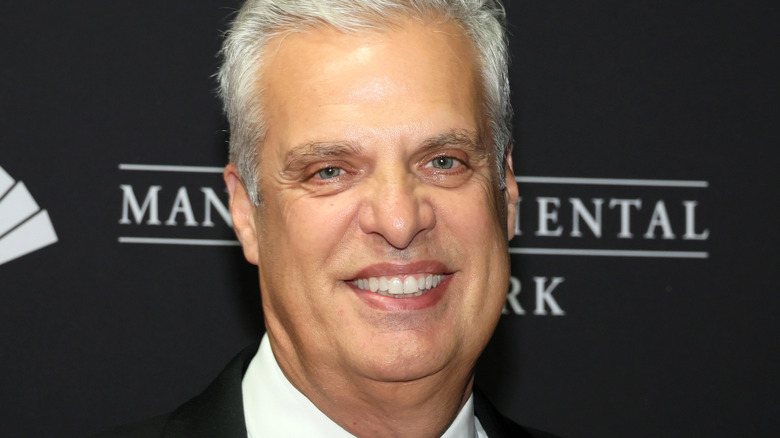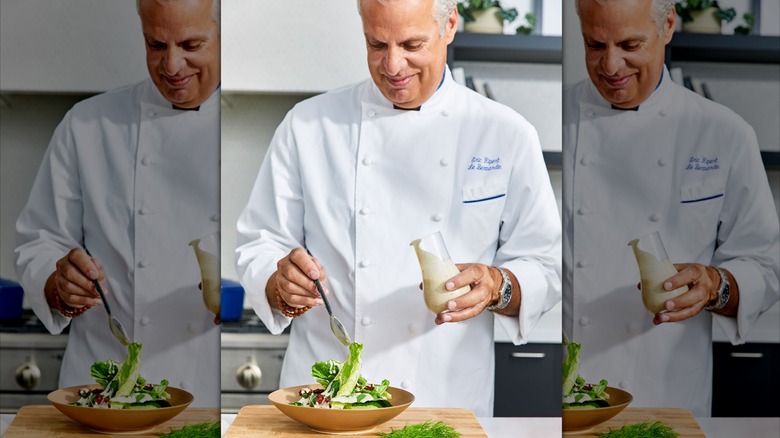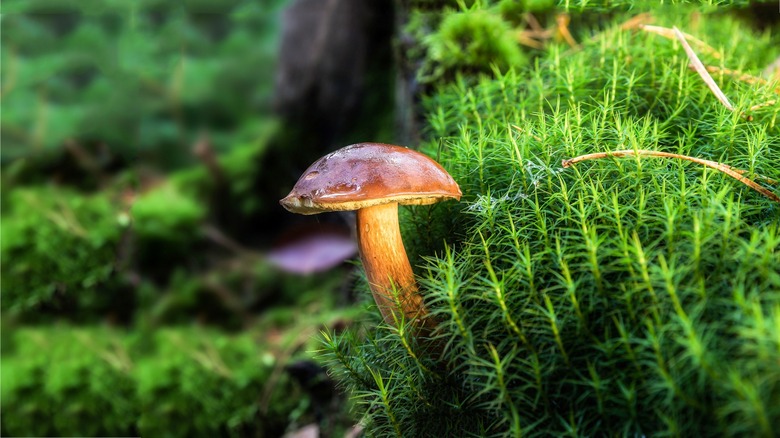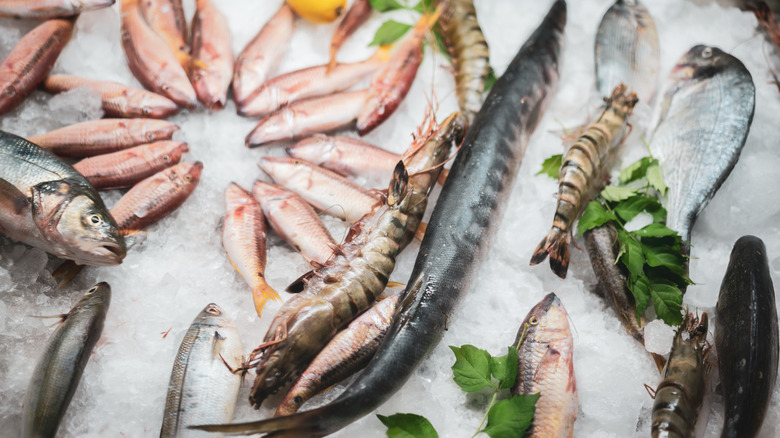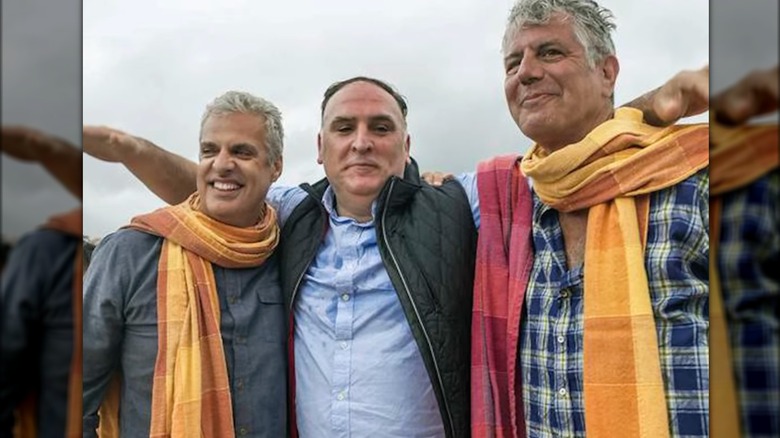Eric Ripert Inspires Environmentally Conscious Foods With New Vegan Dressings - Exclusive Interview
If you keep up with the New York food scene, then you will surely recognize Chef Éric Ripert (or at least his French restaurant, Le Bernardin). Ripert is known for his take on modern French cuisine with a specialization in seafood — hence his new cookbook, "Seafood Simple: A Cookbook," coming out in the Fall. In an exclusive interview with Mashed, the television personality dove deep into his new partnership with Nature's Fynd, a "better for the planet" food brand.
Ripert created three Vegan Fy dressings: Zesty Goddess, Miso Caesar, and Herbed Ranch. They are all fungi-based to promote sustainability and nutritional integrity. While the limited batch is already sold out, Ripert told Mashed that there looks to be a future restock, so make sure to keep an eye out. In the meantime, take note of Ripert's advice on how to be more conscious of the environment when it comes to food. Education is the key!
Fungi has more health benefits than you'd think
I would love to talk first about the vegan dressings. I received them myself and I'm loving them. How did you curate the idea for these dressings? What was the process like?
It was a real collaboration between the team of Nature's Fynd and myself, working together for quite some time on different projects and I'm consulting for them. Then we said, "Why don't we create some dressings?" We worked on it, and we thought it would be interesting to have the Caesar, because a lot of people love Caesar dressing and people who have dairy allergies and so on cannot have it, and that is very similar to Caesar. Then we said, "Well, in that case, let's do the ranch," and we worked on the ranch. We did something bright and summery and we came up with the Green Goddess.
In what ways are the vegan dressings different from ones that are already on shelves in your opinion?
It's not comparable with any of those dressings. First of all, it's, as you know, a mycelium, it's a fungus that happens to be a protein and has the 20 amino acids that the human body needs and as fibers. It's basically like a superfood and [has very few] chemicals, it's not overly processed. [It also has] a bit of oil and some seasonings and so on.
I haven't found anything similar to that on the shelf yet, but I found some vegan dressings that didn't have the same flavors. They were not as good to my taste and to the taste of the team that worked on those dressings. We thought we were, in terms of deliciousness, ahead of the game. This is a dressing that's really special because you don't need land, you don't need pesticides. It's not GMO; you don't need fertilizers. It's great for the planet as well.
I love that, and they're already sold out.
They were sold out because we did a limited series for fun. We were like, "Let's try. Let's see if people like it, and then we will see later on if..." The idea is to, later on, probably have a collection of dressings. That was a small experiment and it was a huge success.
I was going to ask you if there's going to be an opportunity for people to purchase them again, but I guess there will be, right?
It will be, probably. I cannot say 100% because I have to consult with Nature's Fynd, but I would say a 99.99% chance.
You can make chocolate mousse with fungi
What other ways do you think that the food industry can start incorporating fungi into foods?
Like I mentioned, the benefit of fungi is that you don't need land, you don't need animals. You don't need pesticide and GMO and fertilizers so, therefore, you're protecting the land and you're protecting the water. There's no pollution. It's a different product.
It has to be delicious because if we want consumers to buy those products, if they are not delicious, nobody cares if it's good for your health and for the planet. At the end of the day, people like to have something delicious when they eat. We have a lot of future[ideas], because Nature Fynd has worked for years on creating different products that are not necessarily on the market.
The cream cheese on the market from them ... I have to tell you, when I went for the first time years ago to Nature Fynd, I was blown away. I couldn't see the difference between real cream cheese and their cream cheese, and it's very similar to those dressings. It's very difficult to see the difference between a real Caesar and this one, right?
[As for] the fungi dressing — when we are able to do something delicious, which we are right now, it's a bright future and I'm very optimistic about what we can bring to the market. People will be delighted to eat a great chocolate mousse that has pure fungi and chocolate in it and that's it.
I tested it already. They're very slow in putting products on the shelves. They're not in a rush, because they really want to take their time and make sure it's perfect. I tested yogurt first and I tested ice creams and I tested cream cheese and the breakfast sausage. That is really good as well. The first thing that you say, it's like, "Wow, it's delicious." Then your thought process is like, "Oh, wow, this is a fungi," and, "Oh, by the way, it's going to be a lot of positive [feedback coming out] about that."
Become more educated and environmentally aware
Now that we're on the topic of being more environmentally conscious and you actually focus on seafood, you have the seafood-focused cookbook coming out in October. How do you think we can become more environmentally conscious in terms of our seafood consumption, in your opinion?
By being educated. It's very simple. Education is key to everything. If we want to move in the right direction, we have to have an education with good information and mentioned seafood right now. We work with different organizations that give us their opinion on what's happening in the ocean and the species and the stocks that are potentially stressed or not. The NOAA (National Oceanic and Atmospheric Administration) is a great source of information. It's a governmental organization. You also have the Monterey Bay Aquarium. You have different organizations that create lists.
On our own, we also are at the head of the game in many ways by working with small fishermen and day boats, who are using the right techniques to catch the fish, and it's not by catch by having those long liners. When we buy scallops, they are harvested by scuba divers, so they don't drag the floor of the ocean.
Then, we follow the season. The government in America is very proactive. They have quotas and they monitor the stocks. When they see that, for instance, halibut is about to go spawning, they stop the catching in some areas and they open fisheries somewhere else and so on. One of the greatest success stories in America is the striped bass. Striped bass in the late '80s-'90s was on the verge of disappearance on the East Coast, and striped bass is now plentiful. You have striped bass everywhere. They came back. In Europe, they are, at the same time, something similar. Scallops were disappearing. Today, scallops are plentiful.
It's a lot of things we can do to protect the species and, at the same time, have a diet that is mixed. I don't believe in extremes. If we ask everybody to be vegan, we're going to have a lot of pushback. If we ask everybody to eat only fish, same thing, or only meat. People want to have options and the more we inspire people to have options, and the more educated they are, the more they will make the right choice and move in the right direction. It has to be something that is not imposed on people. They have to feel good about their choice.
What is your go-to seafood dish right now? You mentioned halibut or sea bass.
I like seafood that comes from the Northeast, because it's not too far from New York, so I'm speaking about from the Carolinas up to Canada. That's what we mostly serve at Le Bernardin. It's hard for me to say I like only crab or shrimp or cod fish ... I like all seafood and depending on what I'm cooking and eating lately, I'll choose the right technique to enhance the qualities of that species.
Ripert and Anthony Bourdain were great friends
What would your go-to technique be for salmon? I cook that a lot and I was wondering what your advice would be for that.
In "Seafood Simple," we have a lot of techniques demystified. Salmon, it's easy because you can grill salmon, you can broil it, you can poach it, you can steam it, or you can bake it. Salmon is a very easy fish to cook. Baking or broiling is the simplest because ... You can even put it in a toaster oven and have a fantastic result. You can use a piece of aluminum foil, a little bit of oil, and your salmon can be seasoned in a broiler for a few minutes, depending how rare or not you like your fish. I like the salmon medium rare for myself, but it's pretty simple.
What are your go-to seasonings for that? Do you normally do simple?
Salt [and] pepper. At Le Bernardin, I think 99% of the seafood that we cook, it's salt [and] pepper. The salt really extracts the flavor of the seafood. The more ingredients you put on it, the more you lose the identity of what you are cooking.
I know you talked a lot about Anthony Bourdain and how he helped people connect through food. I'm curious if he offered any advice, or if there's something you learned from him that you still use today that you would want people to know?
Anthony never shared with me advice on how to cook any kind of ingredients. He would tell me what he likes and I would tell him what I like. He would tell me the techniques he enjoys using and I would tell him my techniques and that was more like a dialogue. I was not his mentor and he was not my mentor in terms of cooking, that's for sure. We were great friends and we had fantastic interactions together in private and on the screen and on many other occasions. That was the relationship that I had with Anthony.
He was very inspiring because he will take you, if you were a viewer or if you were going to listen to him somewhere and he was giving a lecture, he will transport you to another part of the world where you have never been and he will share with you the passion that he has for that part of the world. Then, you will virtually get inspired and connect with people on the other side of the Atlantic or the Pacific and the world was very close. Food is a great communicator, and Anthony definitely believed that very strongly and in all his shows is how he connects and we learn about cultures through food and through sharing food with others.
Learn more about Nature Fynd's vegan dressings here. You can keep up with Eric Ripert's latest projects on his Instagram page.
This interview has been edited for clarity.
